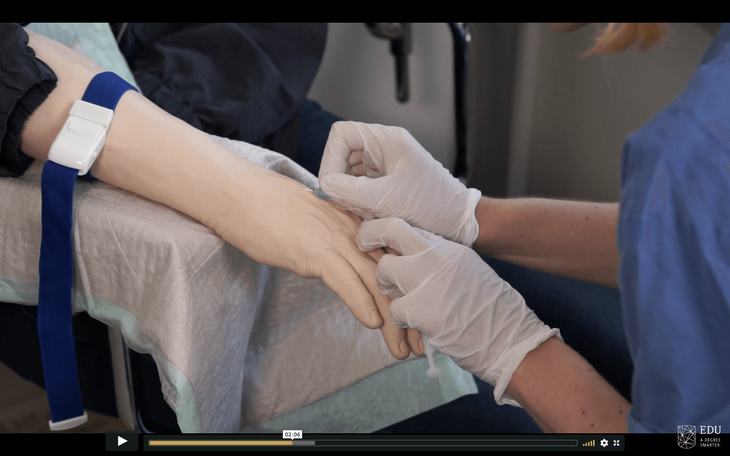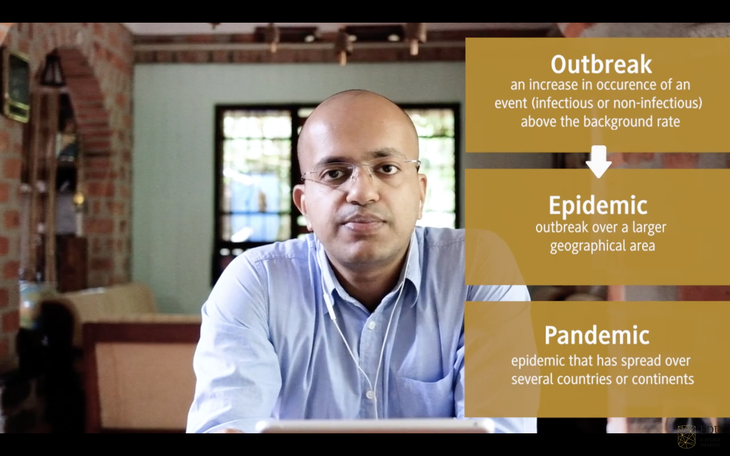EDU Hygiene
is an online training programme on Safety and Hygiene in Infectious Diseases for professional staff working in retirement homes and hospitals
Provided by EDU,
which is operated by Digital Education Holdings Ltd. (DEH)
EDU Hygiene
The current pandemic has been a particular challenge for those working in hospitals, older adult care facilities, and nursing homes for both new and well-experienced alike. All healthcare workers and staff can relate to how a top priority for patient safety is the strict adherence to hygiene standards. Alongside the more current challenges of COVID-19 in nursing homes, the often preventable hospital-acquired nosocomial infections are common and ever-reminding that a top priority for patient safety is the strict adherence to hygiene standards.
This said, the Faculty of Medicine and Health at EDU and designated Dean, Dr. Prof. Andreas Hoeft, have developed a certified online training for nursing staff, particularly in care, who want to better protect their patients and themselves against infections, including COVID-19.
In the course, participants will:
- Practice preventive hygienic measures for infection protection;
- Practice cleaning wounds hygienically, preparing infusion systems, applying intravenous catheters and other procedures in a sterile manner;
- Manage the incidence, prevalence, mortality, diagnosis, therapy and possible complications of the most common communicable infectious diseases in wards and nursing homes.
More information, and how to enroll an institution, can be found here.
"Their biggest fear is that instead of providing care, they cause harm"
our insight of the week - June 5, 2020
photo courtesy EDU
Caregivers have been at the forefront of the coronavirus pandemic from the beginning. The strain they are under increased even further when the first tragic outbreaks of the virus happened in nursing homes, often claiming many victims. A first analysis of data from across the EU by the London School of Economics showed the extent of the crisis: half of all COVID-19 related deaths in the EU appeared to be happening in care homes, and this was even higher in some countries like Spain with 57 percent.
“We don’t do enough as a society to protect our most vulnerable people”, says Jürgen Laartz, one of the founders of the private online university EDU. Laartz wants to change this by providing caregivers with the skillset to deal with the unparalleled situation of this pandemic. EDU started offering an online training on Safety and Hygiene in Infectious Diseases for caregivers in April. The short course provides crucial information on how to prevent the spread of infectious diseases and in particular the new coronavirus while giving care.
When initiating the program, Laartz spoke to a lot of caregivers to find out what kind of information and help they needed. “Everybody is worried about infecting the patients. That instead of providing care, they are causing harm”, says Laartz. And sadly, cases have shown that caregivers can be super-spreaders because they are in close contact with a lot of people. What Laartz found is that a lot of caregivers don’t receive enough help and information from their employers, if they have any, while where to find information is overwhelming for those engaged in informal caregiving, for example, with a loved one.
Nursing homes are generally problematically under-staffed and this is especially the case during pandemic. And while these companies and institutions should ideally provide their non-nursing caregivers with the resources to participate in hygiene training, particularly for this pandemic, high turn-over and lack of staff makes this nearly impossible. In reality, the majority of nursing home management Laartz spoke to were reluctant, he says. “There is no legal requirement for these caregivers to receive additional training against the spread of infectious diseases, so most companies and institutions don’t want to spend money on it”, says Laartz.
So, as things stand right now, the onus is on the caregivers, both inside and outside nursing homes, to gather the information and educate themselves. With wages too low and hours too long, many of them already have too much on their plate to ask more of themselves. “A lot of them are left to their own devices”, says Laartz, “and this is where we want to make an impact”.
photo courtesy EDU
Because the whole training course is digital, caregivers have no geographical restrictions, while the course’s flexible structure allows trainees to participate according to their individual schedules. The practical parts of the course are explained in detailed videos: they are shown how to put on and remove gloves without contaminating anything, how to wear a mask safely, or how to touch patients without infecting them during moments like bathing. Caregivers learn how they can maintain a personal connection with the residents while being aware of the boundaries. Participants also have a tutor they can ask for additional guidance for situations specific to them.
The short course is 25 hours long and can be completed in a week at a cost of 250 euros. There are two different skill levels to choose from, one for students of medicine and professional nurses, where a lot of theoretical background is provided: how does COVID19 work, how does the infection spread, how can we minimize inflammation from infection and why are certain procedures necessary¬? The second level is for professional caregivers with a non-academic background who want to focus on practical training, as well as those engaged in informal caregiving.
“This virus puts a new form of responsibility on caregivers at every level”, says Laartz. “We all need to do more to help them take care of their patients, and themselves.”
To find out more about this course, visit our website, or contact the team directly at info@safetyandhygiene.eu
June 5, 2020 by kENUP
photo courtesy EDU



